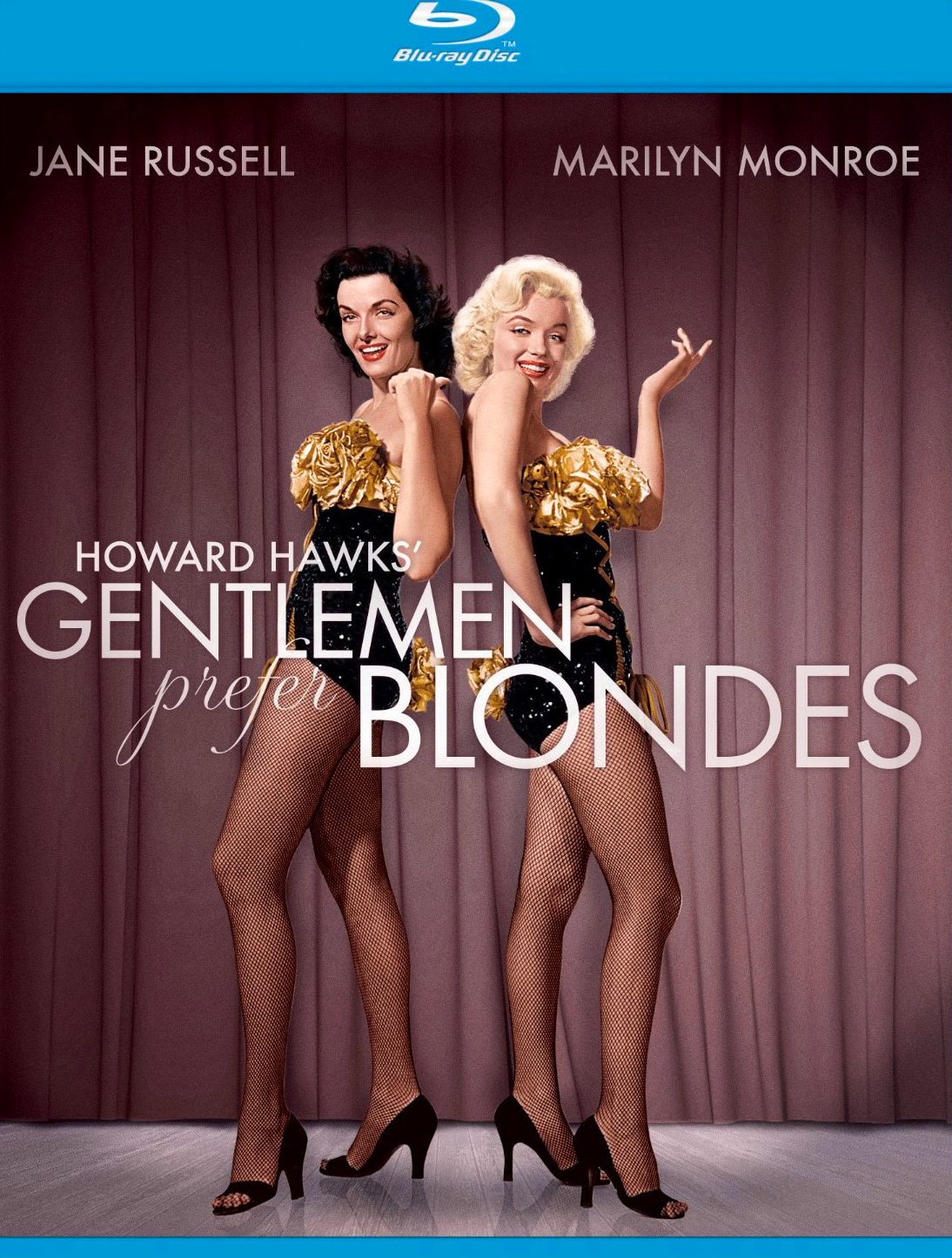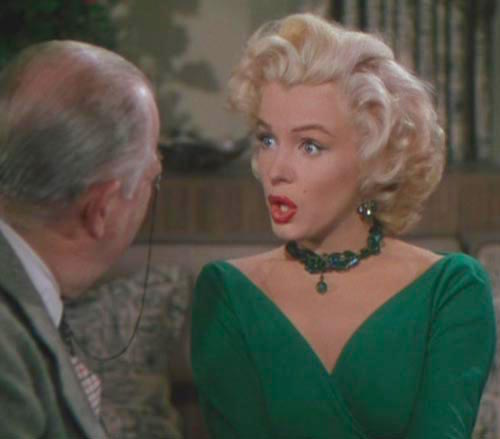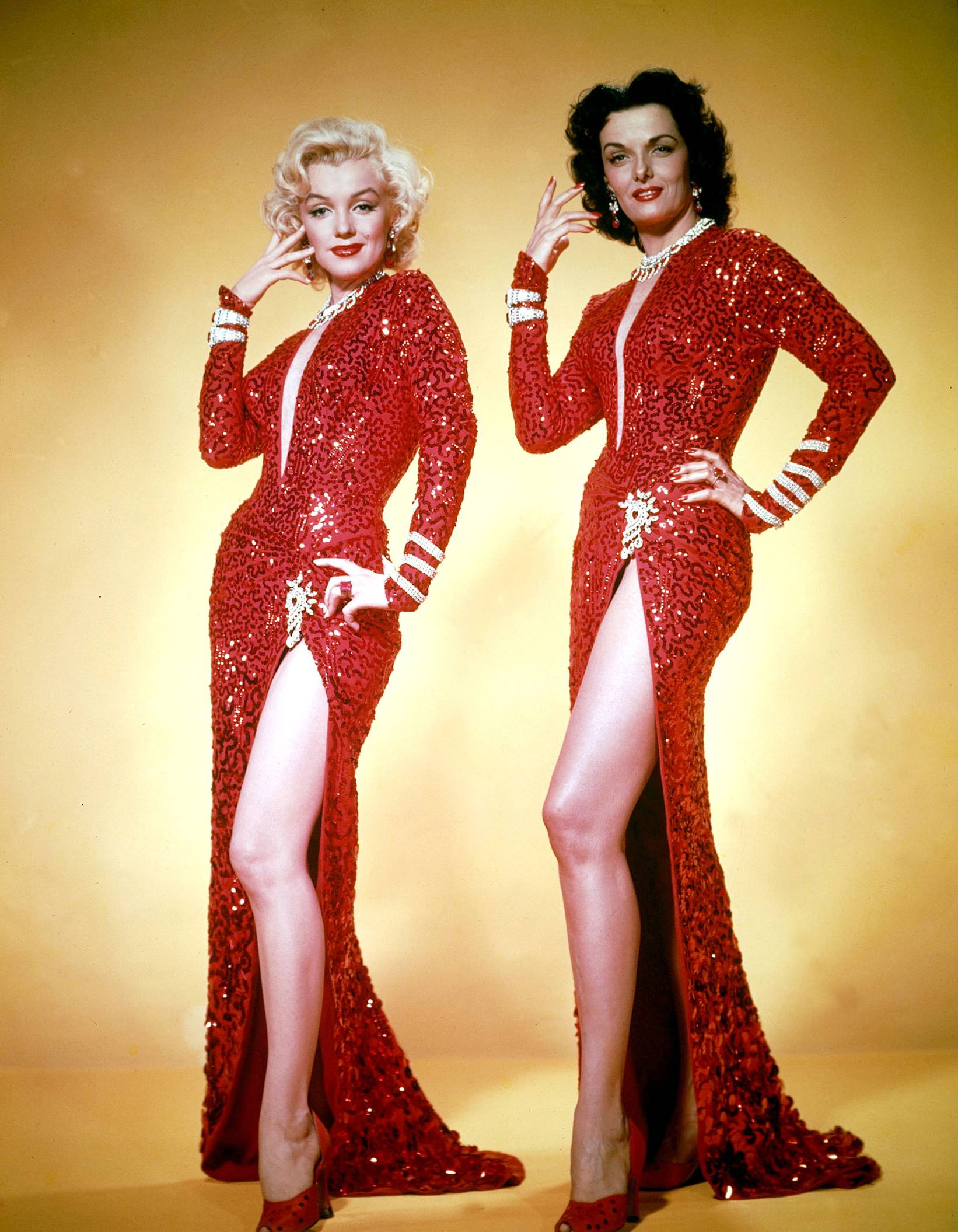Gentlemen Prefer Blondes - An Appreciation
 Tuesday, August 7, 2012 at 8:08PM
Tuesday, August 7, 2012 at 8:08PM [Editor's Note: Last winter when Michelle Williams was in theaters cooing as "Marilyn", I had planned on a Marilyn week. It didn't happen but I wanted to share this piece by our once in a blue moon contributor Ester Bloom because I, too, adore this movie. - Nathaniel]

'Say, they told me you were stupid!'
'I can be smart when it’s important, but most men don’t like it.' "
Marilyn Monroe is not so different from Lorelei Lee, the part she plays in Gentlemen Prefer Blondes. Both are entertainers from small towns who started out poor but are determined to transcend their origins; both turn themselves into sexy cartoons; both play dumb when necessary; and both perform under alliterative pseudonyms that are as girly as all get out. (Compare the name “Lorelei Lee” with that of her friend “Dorothy Shaw.” The difference tells you almost everything you need to know about their characters.)
Maybe Monroe recognized a kindred spirit in Lorelei Lee...
Maybe she realized that the part was one guaranteed to make her, at last, a star. Regardless, she threw herself into the role, and the resulting film is, of all her vehicles, my favorite. When I watch Gentlemen Prefer Blondes, with its slapstick humor, wacky plot contrivances, and random musical numbers, I am charmed all over again by how dedicated and sincere Monroe is. For one, Monroe can barely sing, but that’s easy to forget as you watch her purr her way through her numbers. Throughout the movie, she barely speaks; instead, she whispers, coaxes, murmurs, giggles, and vamps, opening her eyes wide and dropping them into a sultry pout as needed for emphasis. She’s giving this performance everything. Her co-star, Jane Russell, is great as Dorothy Shaw, but you can tell she’s having fun playing the witty brunette; to Monroe, success in this comedy as the ditzy blonde is life or death...
The contrast—and the stalwart friendship—between the two characters bring the film to life. Dorothy Shaw and Lorelei Lee are good-looking, talented, and devoted to each other. They also have different goals. Dorothy is shrewd but romantic; she wants to marry for love. As for Lorelei … well, Malone, the private detective paid to shadow Lorelei who, in the process, falls for Dorothy, calls Lorelei a “mercenary nitwit.” (He’s the only man in the entire film that withstands the full-on assault of bombshell femininity, the heady blend of innocence and sex appeal that is Marilyn Monroe.)
 But he’s not far off. She’s transparently obsessed with wealth: men who have it, the ways she can get it. When her future father-in-law, a millionaire, confronts her about her motives, she stands firm:
But he’s not far off. She’s transparently obsessed with wealth: men who have it, the ways she can get it. When her future father-in-law, a millionaire, confronts her about her motives, she stands firm:
Esmond Sr.: Have you got the nerve to tell me you don't want to marry my son for his money?
Lorelei Lee: It's true.
Esmond Sr.: Then what do you want to marry him for?
Lorelei Lee: I want to marry him for YOUR money.
She convinces the savvy businessman that she’s perfectly justified in feeling the way she does, in the process delivering the classic Hollywood line, “A man being rich is like a girl being pretty. You may not marry a girl just because she’s pretty, but goodness, doesn’t it help?” Audiences can’t judge her either, not when she’s so guileless and her wants are so simple.
Gentlemen Prefer Blondes is the first of a series of movies where Monroe plays a sweet, wide-eyed character fixated on landing a rich husband—it establishes the highly successful meme that’s carried through in How To Marry a Millionaire and Some Like It Hot. Unlike Dorothy, who gets a whole (hilarious, perfect) number about how horny she is called “Isn’t There Anyone Here for Love?” Lorelei focuses not on sex but on security. Whereas Dorothy sings, “I love big muscles / and red corpuscles / I love a beautiful hunk of man,” Lorelei makes clear that she wants a man with a bulging pocketbook—that’s all.
In this film, as in the others that continue to play on this idea of Monroe’s abundant but safely-channeled sexual energy, Monroe represents the 1950s, the post-war ideal of women as simple, feminine, and happy to be taken care of. During the 40’s, women had been told to step up and do their part for their country in the absence of men. They worked in factories and offices; they played baseball; they got dirty, made money, and enjoyed a certain amount of freedom. Afterwards, though, once the soldiers were home, they were told to take off the overalls and get back into petticoats and corsets. For some, this was a jarring transition.

Gentlemen Prefer Blondes was written (first as a stage show, and then adapted for the screen) during this fascinating period of transition. While soft, curvy Lorelei represents the ‘50s as a woman who wants nothing more than a provider, Dorothy represents the lingering spirit of the independent ‘40s. Her appearance marks her as a holdover from that era: taller and more angular than Lorelei, she strides into rooms wearing suit coats with shoulder pads and pants. From her wisecracks to her refusal to take Lorelei’s advice to marry for money, it’s clear that Dorothy has no interest in typical domesticity. She’s a Girl Friday, not a housewife.
But gentlemen do prefer blondes: Monroe went on to blazing success while Russell’s star faded. The movie is now largely remembered as Monroe’s, the beginning of her life as the prototypical ‘50s icon. Monroe died in 1962 just as the culture was changing again and skinny, soulful women like Audrey Hepburn were at the top of their game. Despite two famous husbands, she never got the happy ending Lorelei Lee did; it’s unclear how much she even wanted it. Though she excelled at playing women who just wanted to settle down, settling down didn’t seem to be what Marilyn Monroe was built for.
She never seemed happier than when she was onstage in the spotlight, on the cusp of success, surrounded by men offering her jewels, and singing, presciently...
Men grow cold
As girls grow old
And we all lose our charms in the end
But square-cut or pear-shaped
These rocks don't lose their shape.
Diamonds are a girl's best friend.”



Reader Comments (6)
I watched this for the first time over the weekend and loved it (the Blu-ray is gorgeous). Marilyn really was a special actress and at the top of her game here, I think she's just as great in this as she is in Some Like it Hot. It's a shame that she's so under-appreciated as an actress, doubly so because she was so adept at comedy and people never comedic actors the credit they deserve.
I don't really care for this performance or character. There is nothing really to love, she plays a conniving gold digger, a role she would go on to play in How to Mary a Millionaire and Some like it Hot. However, in those films she made the character loveable, you want to see that she turns out okay. In this film I didn't care about the outcome of her character, in fact I was hoping she would get dropped like a hat by her beau.
This is probably my favorite of her films too and as wonderful as she is in it and her character a charmer it's also became a prison as far as her higher aspirations as an actress went. From this point on even in her best films she is the gentle, sexy somewhat lost soul. In the year leading up to Blondes she had the chance to play a simple, real girl in Clash by Night and a murderous noir vixen in Niagara. She was the original choice for the Gloria Grahame role in The Big Heat but Fox wanted too much money for her, a shame because even though Grahame was brilliant it could have lead to Marilyn having a more varied filmography. Those opportunities evaporated with Gentlemen Prefer Blondes, something that she commented on during her lifetime. Still a wonderfully fun film with great chemistry between Marilyn and Jane.
What a great piece! I think you hit it on the head...she did represent a moment in time perfectly. I wonder if she'll still be talked about 50 years from now.
Loved reading this piece. Gentlemen Prefer Blondes has always been a favorite of mine, partly because it is such a spectacular vehicle for two beyond worthy ladies who both step up to the plate brilliantly, and partly because the film itself is so sparkly and colorful and fun and in love with itself that it is impossible not to fall in love with it too. But it gets my ultimate respect for being a film about two women who are immediately identified as something that our society deplores and demeans, i.e. goldiggers, and still choosing to make them lovable, intelligent, independent women. And even better, both women are given the opportunity to express their desire and enjoyment of sex, without being vilified for it! And as the icing on top of the cake, Lorelai and Dorothy are supportive of each other, and the film never stoops to cat fighting to make conflict for the characters. How's that for progressive---I can barely think of one mainstream hit of the last 20 years to pull off such a feat with such success.
Point of order, but Dorothy isn't a gold-digger; she states pretty clearly she's not very interested in money, and it's a running joke that all the guys she falls for are poor, to the point that she only starts to become interested in Malone once his cover as a rich man is blown.
Watching 30s-50s comedies like this makes one realize how much Hollywood lost when trains and passenger liners ceased to be the primary means of long-distance travel. How many scenes in this movie (or in The Lady Eve, The Palm Beach Story, Some Like It Hot, etc.) would be impossible to translate into a world of consumer air travel?